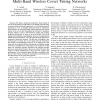Free Online Productivity Tools
i2Speak
i2Symbol
i2OCR
iTex2Img
iWeb2Print
iWeb2Shot
i2Type
iPdf2Split
iPdf2Merge
i2Bopomofo
i2Arabic
i2Style
i2Image
i2PDF
iLatex2Rtf
Sci2ools
109
click to vote
INFOCOM
2010
IEEE
2010
IEEE
An Attack-Defense Game Theoretic Analysis of Multi-Band Wireless Covert Timing Networks
—We discuss malicious interference based denial of service (DoS) attacks in multi-band covert timing networks using an adversarial game theoretic approach. A covert timing network operating on a set of multiple spectrum bands is considered. Each band has an associated utility which represents the critical nature of the covert data transmitted in the band. A malicious attacker wishes to cause a DoS attack by sensing and creating malicious interference on some or all of the bands. The covert timing network deploys camouflaging resources to appropriately defend the spectrum bands. A two tier game theoretic approach is proposed to model this scenario. The first tier of the game is the sensing game in which, the covert timing network determines the amount of camouflaging resources to be deployed in each band and the malicious attacker determines the optimal sensing resources to be deployed in each band. In the second tier of the game, the malicious attacker determines the optimal trans...
| Added | 28 Jan 2011 |
| Updated | 28 Jan 2011 |
| Type | Journal |
| Year | 2010 |
| Where | INFOCOM |
| Authors | Santhanakrishnan Anand, Shamik Sengupta, Rajarathnam Chandramouli |
Comments (0)

